“I would like to use this project as a way to share the stories of my peers in Edinburgh and beyond. I have decided to do this in a similar style as, “Humans of New York”. Brandon Stanton founded this project in 2010 when he made it his goal to photograph a total of 10,000 New Yorkers on the street. He eventually began to interview them and include small stories beside their photographs. It has transformed into a New York Times best-selling book and an Instagram account with millions of followers (NPR Staff). In an interview, he explained the importance of his work: “I think what Humans of New York does is highlight maybe the other tones of our lives that people aren’t so willing to express… Then, there’s somebody in my audience that’s reading that and says, ‘You know what, I’m going through the exact same thing, and I was afraid to talk about it also’” (NPR Staff). Rather than interviewing strangers on the street, I have reached out to people in my life of different ages, backgrounds, and nationalities. Through these intimate snapshots, I intend to display not only how differently we have all experienced Covid-19, but also the deep wound that we have come to share. As Stanton says of his project, my hope is that someone reading my asset will recognize that they are not alone in how they have felt during the pandemic. ”
Jordyn Jacobsen
International Relations
Undergraduate, Year 1
New York, United States
Currents 2021
Gro Munthe Gisleberg
(20, Norway)
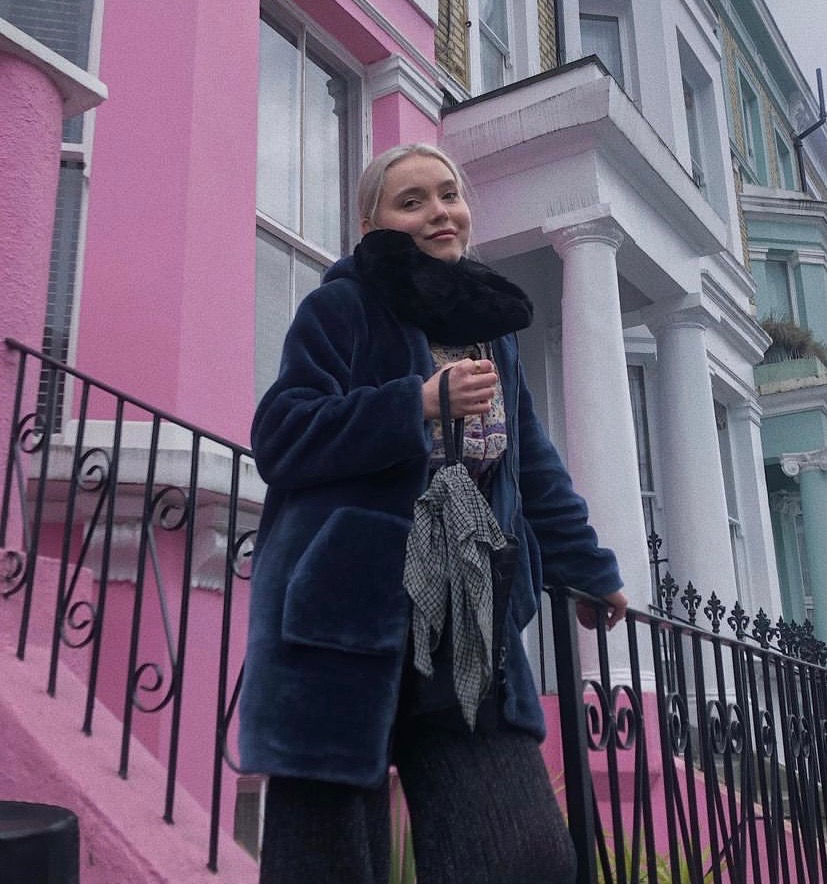
“It was the end of an era for me.”
“Well it started in the fall and then just kind of stayed in China, which is so far away. So at first I didn’t think of it as anything, just something that wouldn’t really affect the people in the north or in the west but still extremely sad. When it started moving towards other places in the world and to Europe, me and my friends were very isolated because we lived on an island at this school.”
“It was a Scandinavian school where you can go after high school if you want to study sailing, musical theater… all kinds of stuff. There’s no grades because it’s for self improvement; it’s just for figuring out what you want to do in life. When the first Covid case came to Norway, we had to leave the school the next day. Some people were really scared- I was just a bit shocked. We couldn’t sit next to each other in the same way that we could before: we had to leave a meter in between us. I just couldn’t believe what was happening. We packed our stuff and they had two buses to take us to Oslo. We all went our separate ways after that. Everyone left so much stuff in their rooms because they thought we were going back. It was the last time a lot of us saw each other… it was the end of an era for me.”
“Then I went home. I feel like I was in a better situation than most people because I live in the countryside. I could still go out in the garden and go for a walk with my dog. We didn’t really have to follow the restrictions in the same way as in the city because the cases were really low and there’s not that many people living close to each other.”
“But I couldn’t see my friends that often. I just got into a routine that wasn’t even something I was aware of. It just happened and wasn’t the most productive, best routine: waking up late, not really having anything to look forward to in the day and just kind of sitting there, not doing much. I spoke to my friends for 3, 4 hours at a time. Like my best friend, we used to call each other and have each other on speaker while we were sleeping.”
Siddhant Singh:
(19, India)
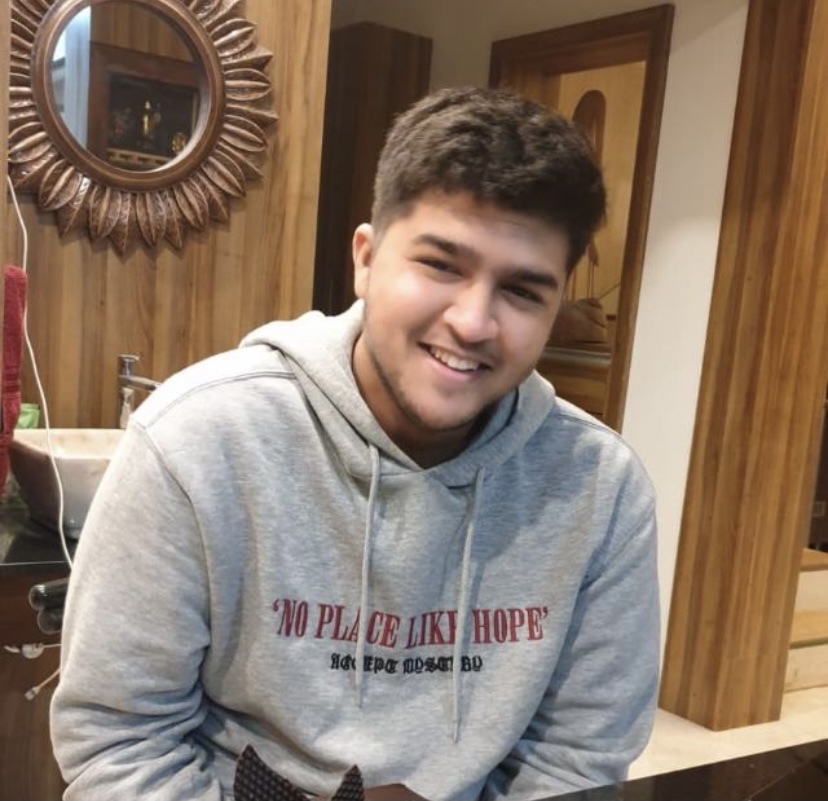
“Every single person I know and every single person they know lost someone.”
“I had applied for university and I got in. I was really excited to come. I was supposed to go in September, but I couldn’t because that’s when we couldn’t physically go to Delhi and get my visa. We had to postpone that to December. So we went to Delhi on the 24th or 25th of December and spent Christmas there. As soon as we came back, all of us tested positive for Covid; except for my dad, who already had it. So me, my younger brother, and my mother all had Covid.”
“My younger brother was fine because he was 14. He didn’t get affected by it that much. But my mom doesn’t have a good immune system. She’s always sick with something or the other; she’s always on medication for stuff. She had a rapid decline in her breathing so she had to go to the hospital. My dad was like, ‘if your mom goes she’s not going to be able to see us or come out, so why don’t you go in with her?’ ”
“I spent 14 days in the hospital, which was hell. They locked us in a particular floor of the building; You couldn’t leave and you had to keep your window shut. There was just one corridor that went down to the toilets. It was like a prison. And when you’re sick, you don’t want to feel like that- it just made me feel horrible. This was as good of an experience as it gets in my city in hospitals.”
“I was at school in the UK during the lead up to the second wave. I remember speaking to my parents. My dad supplies equipment and machines they use in hospitals. He said that from 9 o’clock in the morning to 12 o’clock in the evening he and my mother would just sit in their room helping people find resources: oxygen, beds, tests. At that point, people didn’t care about working. They cared about making sure that everybody was fine. And I think that’s the beauty of it: everybody just helped each other.”
“I decided to fly back just after Easter break because things were getting really bad. I live with my grandparents-my father’s parents. The next day, they got Covid; both of them. We moved upstairs. My birthday was on the 22nd of April. I had to fish my birthday cake up from the balcony.”
“I thought they would be fine because they had one dose of the vaccine. The one that we were really concerned about was my Grandmother because she had breathing problems. But she just didn’t get that sick. And my Granddad- he was really fit. He was always out jogging, he ate right, he always took his medications on time. So we were never concerned about him.”
“We had to transfer my grandparents to a hospital after 15 or 20 days of them getting Covid. At that point, even if you had worked in the medical industry for a while and you knew everyone there, it was just so bad that you couldn’t get into a good hospital. They had to go to a really, really bad one. My grandmother was fine, but my granddad kept getting more sick. He had stopped eating ever since the first day he went to the hospital. The only way we could get food down was if we gave him something liquid and told him that it was water. My dad could see him getting worse; he could see what was coming. But my brother and I were shielded away from what was going on. We were in complete denial.”
“One day, my father came in and told us that our granddad had passed away. For me and my brother, that was something that we had not even thought of. It was unfathomable. I’m really happy I made the decision to go back because if I didn’t, I wouldn’t have been able to see him for the last time. I’m saying this in a way where it seems like, ‘oh, I lost someone’, but everyone lost someone. Every single person I know and every single person they know lost someone.”
Alexa Jacobson
(22, United States)
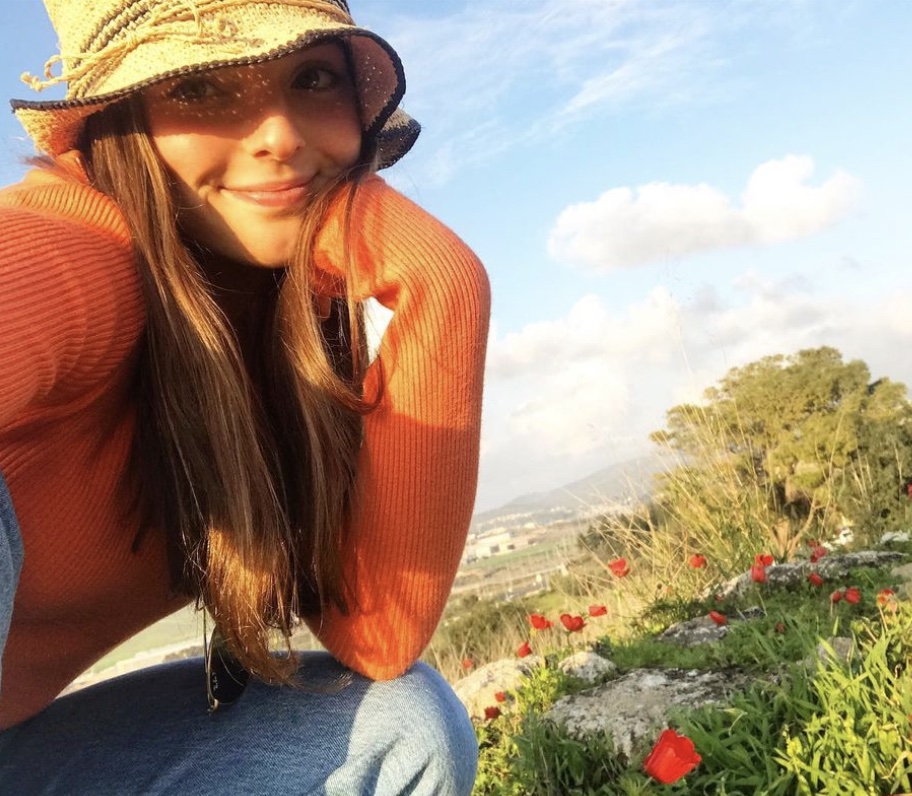
“He said that he was going to close the border in 72 hours.”
“I was studying abroad in Berlin. I originally heard about Covid- I think it was in January- when my roommate came into our dorm room and said, “I just listened to a New York Times podcast about Covid and how people might have to go on lockdown for a little bit and stay home for a week or two’. All of us thought there was no way; that was ridiculous. No one thought it was a big deal and no one thought it was gonna affect our experience abroad.”
“Then it started to get serious. We got calls from our parents saying that we were gonna have to come home and that we only had a week. So we were like, ‘Okay. Our classes are probably gonna go online anyway. Let’s just plan a trip around Germany and do school on the road and then we’ll go home’. So we all went to this brewery one night. Someone brought their computer and we were looking at Airbnb’s and stuff. Later, we went back to my friend’s apartment. Around 2 am, I remembered that Trump was about to speak. I said we should turn it on and then go get gyros. We were watching him and all of a sudden he said that he was going to close the border in 72 hours and that no one could come in or out of America. In that second, all of us got calls from our parents saying they were booking us flights home immediately. They told us to go pack. I was on a plane 6 hours later.”
“The first month of lockdown sucked. Doing school at home sucked. But eventually I started to enjoy it. I went back to school in the summer and it was great. Nothing was all that closed yet.”
“Then school started and it was a mess. No game days, everyone was on and off being sick, everyone was on and off quarantining, everyone was anxious all the time and getting tested all the time. My last semester of school was online. I had to graduate in my apartment. It ruined the end of college.”
Olivia Garcia
(24, France)
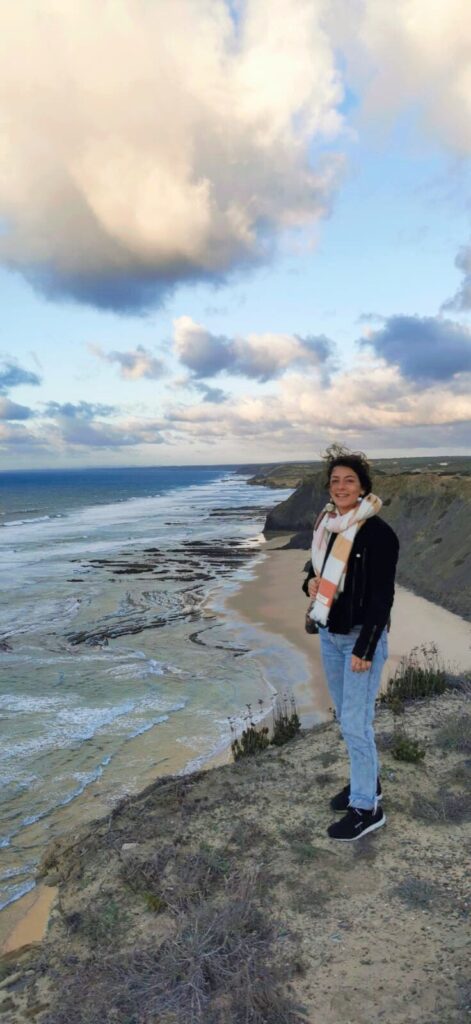
“It made me want to enjoy the present day and the present moment even more.”
“I wasn’t in France through all of Covid. Only the first lockdown. But I would say that the main feeling that resulted from the first lockdown was not fear… it was more anger and an intense frustration. Nobody expected this. Especially us young people- we didn’t really think that this kind of thing could ever happen or that we would have to stay home. A lot of people didn’t understand why we had to lockdown for a disease because there are diseases every winter. Even though this one was spreading much faster, a lot of people thought that you shouldn’t prevent people from going outside. For me, it was a lot of incomprehension and frustration because I thought that it would just last a few weeks… that it was just a short crisis. I didn’t foresee that this was going to be such a huge issue.”
“Also I think there was a kind of disillusionment. You think you live in a country that has a stable economy and then suddenly it’s so shaken. Even though France isn’t the worst case. The government was giving a lot of money to everyone so they could keep most of the businesses open. But the way the country managed the pandemic was very confusing. The public government announcements were changing every day: one day they would be reassuring, the next very alarming. You didn’t even know what the law was anymore. You were completely lost.”
“I decided to travel through Central America because it was a decision I had made before and I didn’t want Covid to stop me from doing my gap year. When I arrived in other countries, there was a sense of relief and a sense that life was easier. I felt like the situation was more stable. There were a certain amount of rules that everyone would follow and nobody was questioning it. Like in Costa Rica, people had undergone a big lockdown and they were not just returning back to normal. They weren’t just locking down, then opening up again, then locking down, etc… I felt that the government and the people were coping with the situation in a healthier and a more efficient way. Even though I mostly saw the tourist side… I don’t really know how it affected the economy.”
“Travelling during Covid made everything more uncertain. It made crossing frontiers so stressful. But it made me want to enjoy the present day and the present moment even more, because you don’t know when it could end. It could be over from one day to the next. Tomorrow morning you could wake up and be in lockdown. In the end, it’s an even more powerful travel experience.”
Murdo Mitchell
(19, United States)
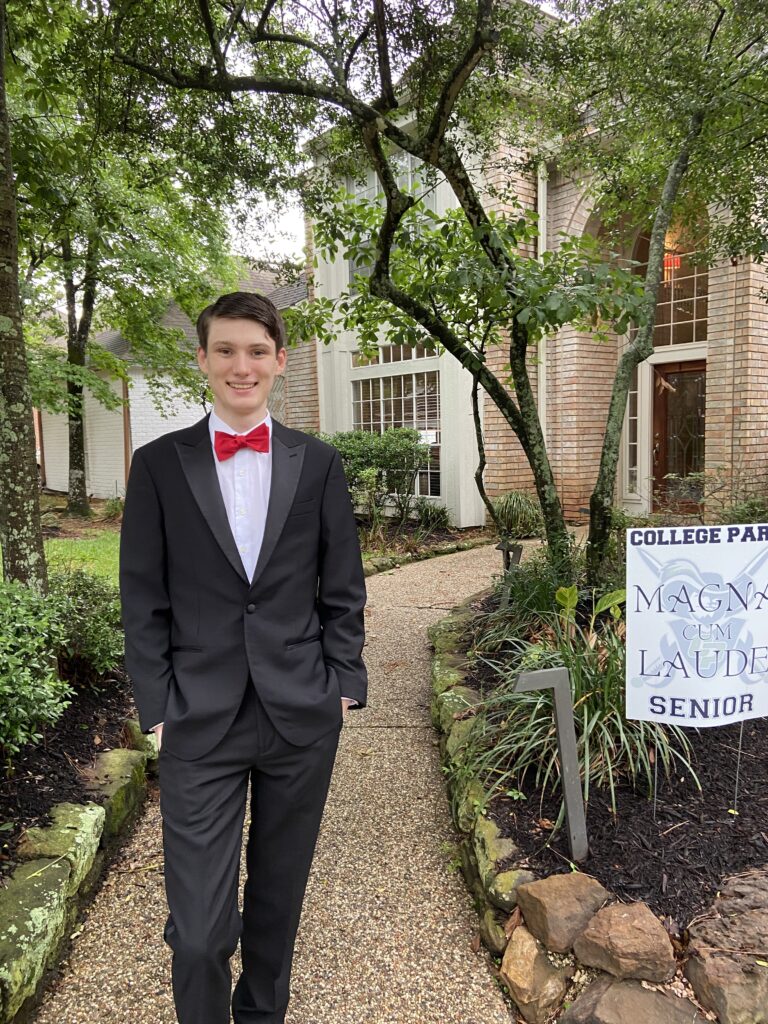
“There were never any actual government rules to stop stuff from happening.”
“Covid hit right after spring break. My band was actually in Disney World. They closed it the day after we flew back to Texas- where I’m from. I distinctly remember being weirded out by people wearing masks. We would make fun of them and stuff.”
“For six weeks after that, I did not see a single person. Most people I know did that. But there were never any actual government rules to stop stuff from happening. There was very little regulation. Only mask mandates for a little bit. All that stuff that people did those first two months was people just doing it of their own accord.”
“I went on an RV trip with my family during the summer that lasted about a month. We normally come back to Scotland where a lot of my family is but that was not possible because of Covid. So we decided to do the most Covid friendly trip that you could possibly do- which is to stay in an RV and go around to see national parks. We left straight from Houston and went north for 4 or 5 days until we reached South Dakota. We spent some time seeing a few national parks there, including Mount Rushmore. It was the time that there was a Trump rally there so there was quite a low mask wearing percentage. There was also a Native American protest, so it was an interesting time to be there. My parents decided not to go in because it was so crowded.”
“We went west further inside the mountains and did Glacier National Park, Yellowstone, the Grand Tetons… Then we went on to Utah and did the Grand Canyon, Capitol Reef, Canyon Lands, Arches, Bryce Canyon, Zion… all the national parks have buildings where they have information about the parks. I wanted to go inside them but we never did. In some ways it detracted from the experience, but we wouldn’t have had the experience at all if it wasn’t for Covid.”
“About the first three weeks of school were online but then it was back in person. They did hybrid learning, which was really hard on the teachers. They had to teach online as well as in person. There was a lot of teacher burnout.”
“I had probably as close to a normal senior year as you could have gotten with Covid in America. For prom, they randomly decided that we didn’t need to wear masks. There were 800 people. We had a maskless graduation in a stadium. It was completely normal- no different than years past.”
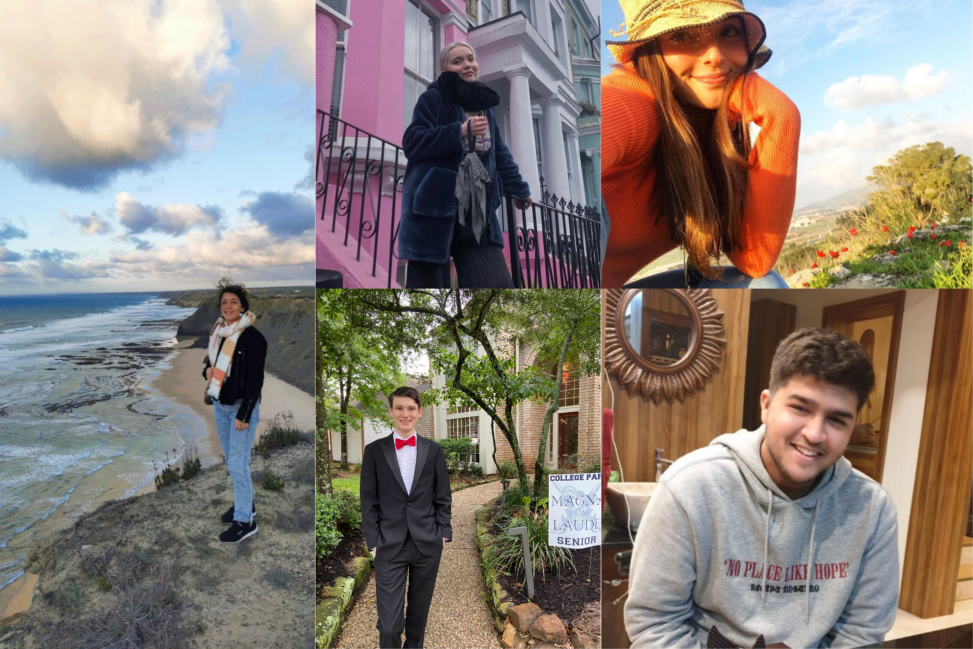


Leave a Reply